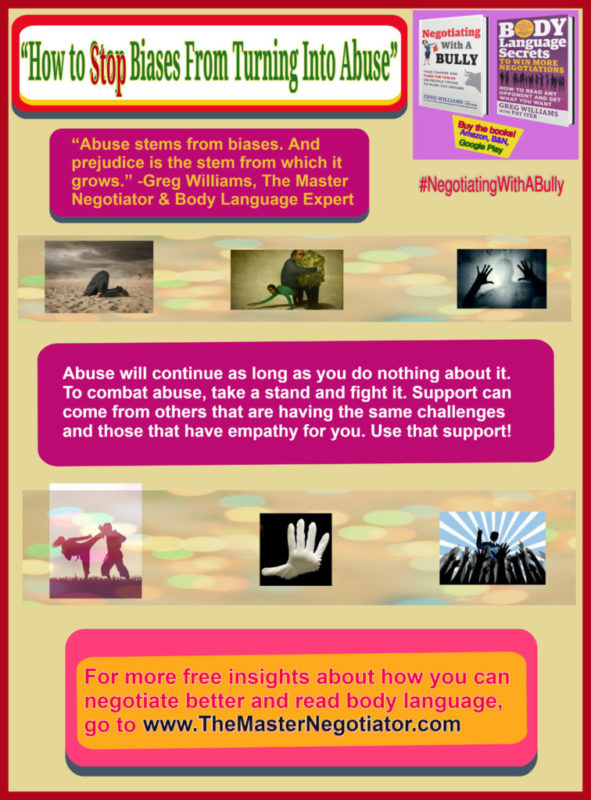“How to Stop Biases From Turning Into Abuse” – Negotiation Insight
“How to Stop Biases From Turning Into Abuse” – Negotiation Insight https://csuiteold.c-suitenetwork.com/advisors/wp-content/themes/csadvisore/images/empty/thumbnail.jpg 150 150 Greg Williams, MN, CSP https://secure.gravatar.com/avatar/1f08a50bcaed92eae0990a65c7808a62?s=96&d=mm&r=g“Abuse stems from biases. And prejudice is the stem from which it grows.” -Greg Williams, The Master Negotiator & Body Language Expert (Click to Tweet)

“How to Stop Biases From Turning Into Abuse”
Every time he wore a red tie, she felt her feelings change towards him. At first, he didn’t notice when the changes occurred. Then, over time, he sensed the difference in her actions. Her disposition wasn’t unpleasant – she was not as approachable as she was usually. In return, he responded to her change by not being as agreeable to her. Neither of these individuals realized it, but they were interacting with each other based on the biases they possessed.
When people engage others, their biases drive the interaction. Thus, you should always be mindful of how you act based on the environment, those in it, and the thoughts you have about both. You should make the same assessment from the other person’s viewpoint too. If you’re not aware of the effect that has on you or them, you can become the target for abuse or an abuser.
To stop biases from turning into abuse, consider these factors:
- How might specific triggers cause you to become irrational, and what exactly might you do in such a state?
- What thoughts are driving you to view your current situation in a particular manner, and could it lead to hostilities?
- Are you conflating past occurrences with the present one? If so, why?
- What powers are you conceding by not controlling thoughts that could lead to you committing negative actions?
- What are your thoughts and beliefs about the people in the environment, and do they stem from hidden prejudices you possess or those with whom you associate?
- What actions are others in the environment engaged in that might cause you to have disdain for them?
- How might you treat someone if you have contempt for them based on the beliefs that you share with others that dislike the same people?
- Are you attempting to impress others by acting a particular way in your present environment?
The point of the questions above is to make you think. And to hopefully do so before a situation driven by your own or someone else’s biases cause you or others to become abusive. In times of heightened tension, regardless of its cause, if you don’t apply a brake to your automatic thought process, that process could lead to unwanted outcomes.
So, before entering into a situation that might escalate due to unseen or unspoken biases, consider how you might guard against them and how you might control an environment should they occur. The better prepared you are to deal with challenges that can escalate and become uncontrollable, the better you’ll be at spotting and containing those possibilities. That will put you in better control of yourself, others, and the environments you’re in … and everything will be right with the world.
What does this have to do with negotiations?
Every negotiator brings biases into a negotiation. They may originate from thoughts about certain ethnicities and how they respond or act with people from other backgrounds. They can also stem from sexual orientation, gender difference, or a host of mitigating thoughts. Some may derive from misguided beliefs that others possess that a negotiator may admire or aspire to emulate.
Regardless of there source(s), biases can negatively impact a negotiation. Therein lies the reason negotiators must be mindful of the prejudices that may exist in a situation. If one is not observant and doesn’t have a plan to deal with it, the unprepared negotiator can find himself dealing with dire occurrences. In reality, those acts may be red herrings intended to thwart your efforts by demeaning you. A deeper intent may be to push you away from the negotiation so that someone of more liking can get engaged.
Never underestimate the power and destruction that biases can have on an interaction. They can quietly erode your power and sap your mental energy. If you neglect such a force, you may be doing so at your delayed peril.
Remember, you’re always negotiating!
Listen to Greg’s podcast at https://anchor.fm/themasternegotiator
After reading this article, what are you thinking? I’d like to know. Reach me at Greg@TheMasterNegotiator.com
To receive Greg’s free “Negotiation Tip of the Week” and the “Sunday Negotiation Insight” click here http://www.themasternegotiator.com/greg-williams/
#Bias #Abuse #BodyLanguage #Nonverbal #Negotiate #Business #SmallBusiness #Negotiation #Negotiator #NegotiatingWithABully #Power #Perception #emotionalcontrol #relationships #BodyLanguageExpert #HowToNegotiateBetter #CSuite #TheMasterNegotiator #ControlEmotions #GregWilliams #success #negotiation examples #Negotiation strategies #negotiation process #negotiation skills training #negotiation types #negotiation psychology #Howtowinmore #self-improvement #howtodealwithdifficultpeople #Self-development #Howtocontrolanegotiation #howtobesuccessful #HowToImproveyourself

